W 7 pm, Coleman 2750
http://ux1.eiu.edu/~nekey/syllabi/5250.htm
Syllabus as pdf (brief version)
week 1. Riot, rebellion, revolution
- Questions for discussion
- Why early modern? What is early? What is modern? (Does the early modern revolution exist?)
- Why Europe? Compare and contrast westernization with modernization? (Is there a peculiar European or Western revolution?)
- Why Revolution? Compare and contrast revolution and riot/rebellion/evolution? (Are historians comparative?)
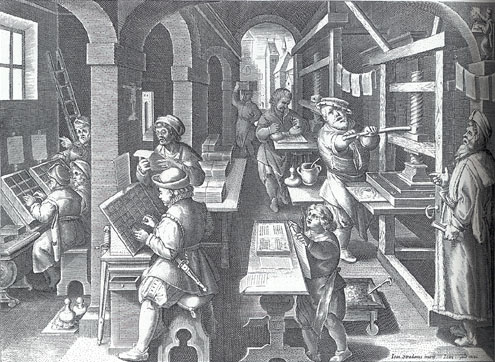
week 2. Theory: Searching for definition
- Quote response prompt
- "A divine right of names does not exist, and definitions of phenomena are to be judged entirely by their clarity, utility, and convenience. For the comparative study of revolution...[,] I therefore propose to use the following:
- A revolution is any attempt by subordinate groups through the use of violence to bring about
- a change of government or its policy,
- a change of regime, or
- a change of society, whether this attempt is justified by reference to past conditions or to an as yet unattained future ideal.
- In this definition, government refers to personnel, such as monarchs and ministers; regime, to the basic form and institutions of government; society, to social structure and stratification, system of property control, and dominant values....
- Far more revolutions have failed than succeeded, and, even when revolutionaries have gained power, they have rarely retained it for long or built durable regimes." Perez Zagorin, Rebels & Rulers 1500-1660 (Cambridge, Cambridge UP, 1984), 1: 17.
- Question for discussion
- Are theories of revolution (as read or read about) necessarily progressive? If so, do their definitions of progressive differ? If not, how do they differ on this issue?
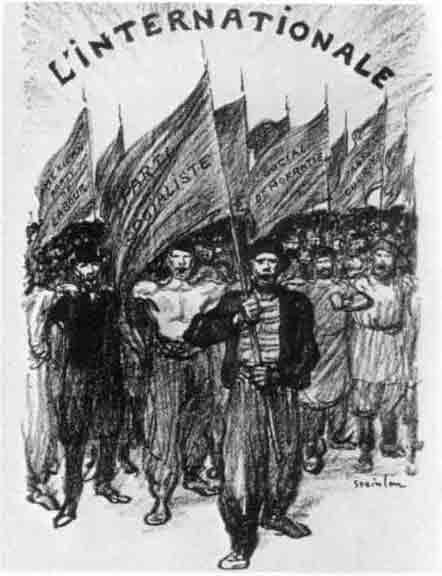
week 3. Theory: Riot, Rebellion, and the Meaning of Politics
- Quote response prompt
- "Apparently in order to distinguish the American from the European crowds of the eighteenth century, historians have usually emphasized the middle-class character of the colonial mobs....
- "[Yet,] George Rude..., [in] The Crowd in History: A Study of Popular Disturbances in France and England, I730- I848..., found the eighteenth-century English and French crowds to be unusually rational with a 'remarkable single-mindedness and discriminating purposefulness.' 'In fact,' he writes, 'the study of the pre-industrial crowd suggests that it rioted for precise objects and rarely engaged in indiscriminate attacks on either properties or persons.'" Gordon S. Wood, "A Note on Mobs in the American Revolution," William and Mary Quarterly 23, 4, 3rd sers. (October 1966): 636-8
- "Apparently in order to distinguish the American from the European crowds of the eighteenth century, historians have usually emphasized the middle-class character of the colonial mobs....
- Question for discussion
- Does the concept of "moral economy" help link our concept of the crowd riot with revolution or separate the two?
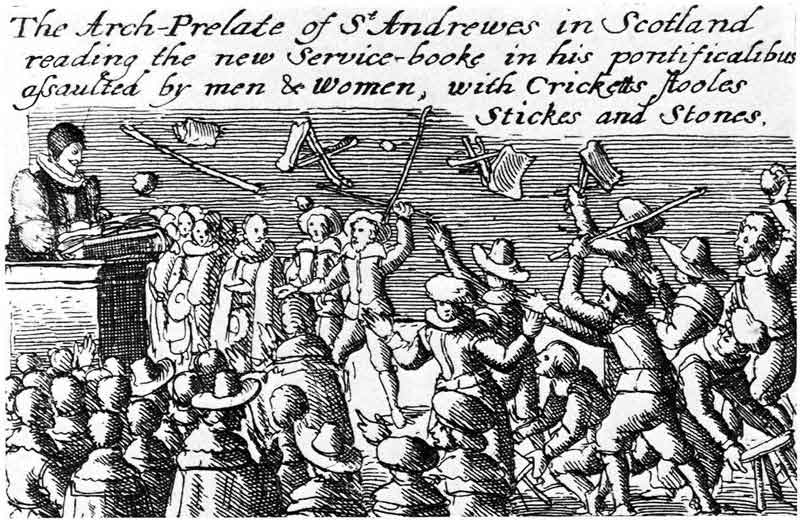
week 4. The Seventeenth-Century World: Food & Family
- "Is it possible to accept without scrutiny the alleged naturalness of the notion of crisis assumed in the general crisis discussions? ...[E]ven if one accepts that an entity called society does exist, that it has natural and lawful patterns of behavior, and that it can thus be likened in its activities to a human body, is the medical notion of crisis an appropriate category for examining this particular "natural body"? In crisis medicine, doctors confront a body that is fixed and finite in its spatial and physical dimensions, and then focus on the decisive moment when this
finite body hinges on the brink of life or death. But does society ever admit of such spatial and temporal finitude? What, for example, are the finite boundaries of society? In the case of seventeenth-century Europe, society extends around the world, yet analysis of the general crisis of the seventeenth century is restricted to events in Europe. To be coherent, should not society be either a global entity, in which case its specific analytical value for European history is lost, or a local (or in this case European) entity, in which case its coherence as a natural system is undermined? These conceptual problems are hard to remove, and to them must be added the physical problem of treating as a crisis-prone organism an entity that does not have any clear physiological existence. How, for example, can society have crises when it is not a physical being subject to
mortality in the biological sense?"
- J.B. Shank, "Crisis: A Useful Category of Post-Social Scientific Historical Analysis?," AHR 113, no. 4 (Oct. 2008): 1096
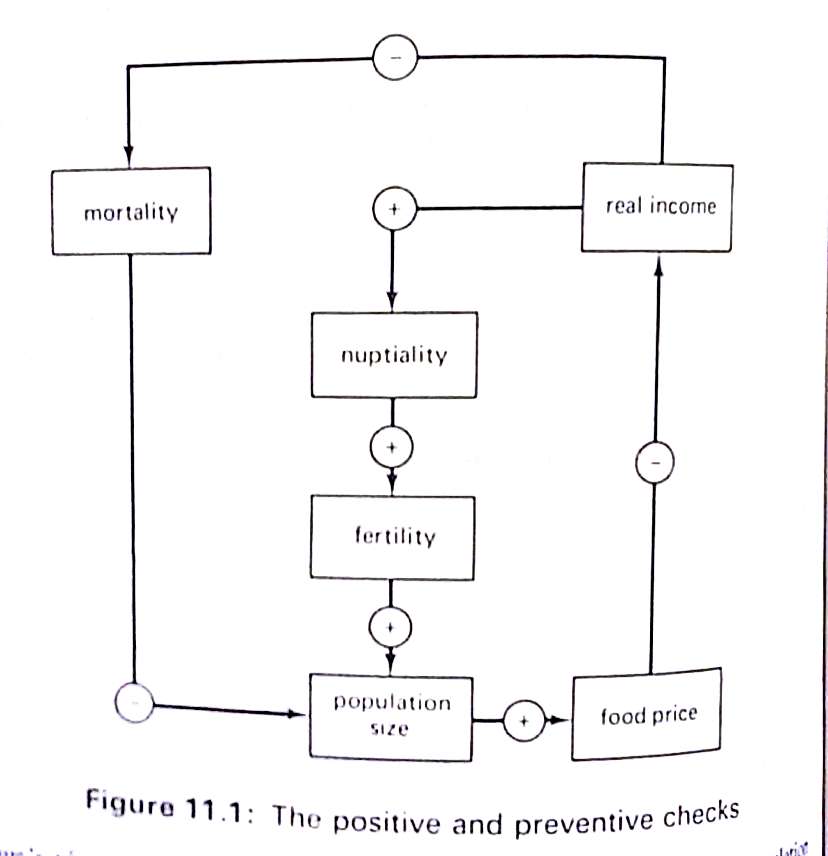
- Quote response prompts (choose one)
- "The circumstances of civil war and revolution generated unprecedented public engagement with Parliament, and significant experimentation in terms of how to participate in its proceedings. This reflected not just the political and religious climate but also the growing importance of Parliament, familiarity with its proceedings, and the opportunities offered by a media revolution. But it also reveals something else that is remarkable about political culture.... First, it is possible to show that multiple low-level interactions between independent citizens and political actors in the public domain helped to generate and modify political norms and contributed to institutional development, in terms of a participatory parliamentary system. Second, and related, it is possible to recover what Charles Taylor has called the social or political 'imaginary' of citizens in revolutionary England.... [C]ontemporaries were...not just participating, but also thinking. This was a kind of political thinking that developed out of personal and practical experience and daily political life, and out of participation in national institutions, and that involved learning to think about how the nation's institutions were supposed to work, worked in practice, and could be made to work more effectively. What thus emerges is a sense that 'radicalism' involved more than merely the strange dreams of marginal outsiders, and that political thinking about big constitutional issues often took place in small and not obviously 'theoretical' ways. --Jason Peacey, "Reviving the Radicals: Clement Writer and the Historiography of the English Revolution," Prose Studies 36, no. 3 (December 2014): 252.
- "'The English Revolution' ought to be entombed. It is a term made out of our own social and political discourse.... It gets in the way of enquiry and understanding, if only because it requires that change of all these different types goes forwards at the same pace, the political pace.... There never was such a set of events as the English Revolution." Peter Laslett, The World We Have Lost, 3rd ed. (1983), 206-9
Adriaen van Stalbemt with Jan van Belcamp, A view of Greenwich (c.1632, detail)
week 6. Regicide and Revolution
- "[Sean] Kelsey has produced a compelling, holistic account of the two-month culminated in the execution of the king. He builds creatively on the work scholars to show that the removal of the king was recognized as dangerous, and to emphasize that for three weeks or more after the army's eruption at Westminster, attempts were still being made to persuade Charles to accede to a limited role. But he fundamentally transcends current scholarship in his suggestion that the wheeling and dealing continued during the trial, and that the trial was itself a key element in that continued process of negotiation. His argument is threefold. That if the king recognized the right of the court to try him, he would tacitly acknowledge the sovereignty of the Commons, and would 'in effect...have conceded the abolition of his own negative voice'; that he could then have been reintegrated into the constitutional structure with a limited, largely formal role, a 'puppet king'; and that monarchy would survive, but in attenuated form'. This is powerful and original.
- "But I do not believe that it is right. There is nothing to support the existence of an organized party in the Commons or the High Court whose members committed to saving the king....
- "The traditional understanding of the role of the army--its own understanding, and that of those who refused to participate in the trial--is also more compelling than Kelsey's alternative, in which the grandees are prepared to negotiate with the king to secure some kind of monarchical settlement."
- Clive Holmes, "The Trial and Execution of Charles I," The Historical Journal 53, no. 2 (2010): 289-316.
week 7. The World Crisis of the Early 17th Century
- Response essay prompt
- "By 1647...[the] demolition of the skyscrapers that had dominated the English skyline and th[e] blueprint for a brave new world appeared to presage the creation of a new, libertarian (and in the aspirations of some, egalitarian) political, social and religious order. Although it was not to be, these mighty events have seemed to many historians to parallel the slaughter of kings, the abolition of monarchy, the assault on inherited wealth and prescriptive privilege, and the challenge to organized religion, that constitute the essence of the other great turmoils of Western Civilization which are unhesitatingly accorded the accolade of Revolutions." John Morrill, in The Impact of the English Civil War, ed. Morrill (1991), 8-10
- Question for response essay
- revolution assignment two due
week 8. The English Response to Civil War
- Quote Response prompt
- "Revisionists...encourage us to discern not so much radicalism and progressivism...the urge for change and innovation...as traditionalism, moderation and conservatism alongside neutralism, inertia, even apathy as the enduring characteristics of the political nation and of the broad mass of the English people alike. Ideology is played down in extent and profundity....
- Fair enough. Such attitudes will readily be found if sought. But so perhaps can others. There is evidence throughout the Interregnum of discontents, sometimes bursting into violence more than verbal, which called for betterment, not just the preservation intact of old standards." Ivan Roots, "Preface to the 1986 Edition," Puritanism and Liberty (1938, 1974, 1986)
- Question for discussion
- Are radicals popular? Are early modern non-elites political? What evidence from the 1640s would help make your case?
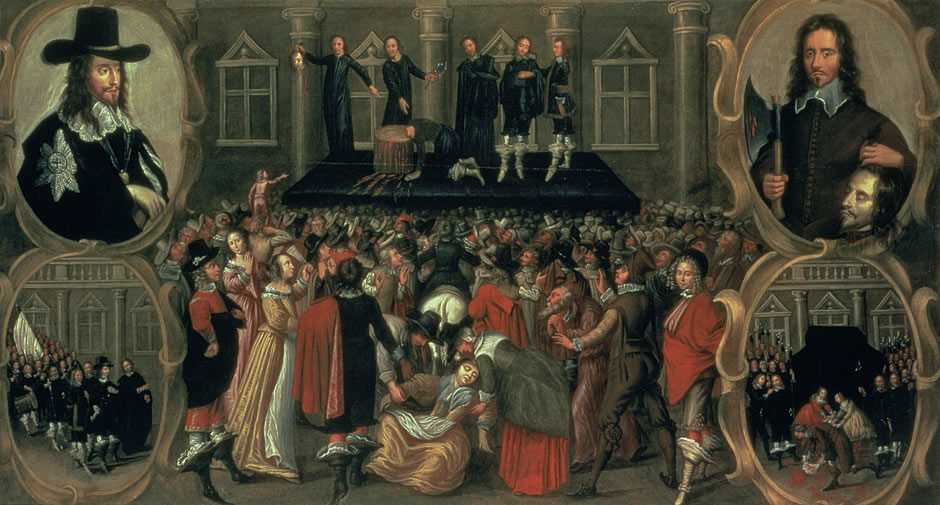
week 9. The English Response to Revolution: What is Popular?; What is Radical?
- Quote response prompt (two together)
- 'Revisionist' scholars have rejected [the] influential notion of a popular, demotic phenomenon that heralded the secularization of society as an anachronistic and overly sympathetic view. For Revisionists, radical belief was a marginal concern in the mid-seventeenth century and was entirely religious in both its origin and its aims.” Philip Baker, “Rhetoric, Reality and the Varieities of Civil-War Radicalism,” in The English Civil War, ed. John Adamason (Basinstoke, 2009), 202
- “The centre of [of such approaches] remains the crackpots, screwballs and fanatics, the nutters and kooks who appear in the wake of every genuine movement for social reform and who become the principal barrier to lasting change.... Nothing has done more to diminish the centrality of the English Revolution that did occur than obsessive concentration upon the English Revolution that didn't occur.” Mark Kishlansky (1984), quoted in The Debate on the English Revolution, ed. R.C. Richardson, 3rd. ed. (Manchester, 1998), 184
- 'Revisionist' scholars have rejected [the] influential notion of a popular, demotic phenomenon that heralded the secularization of society as an anachronistic and overly sympathetic view. For Revisionists, radical belief was a marginal concern in the mid-seventeenth century and was entirely religious in both its origin and its aims.” Philip Baker, “Rhetoric, Reality and the Varieities of Civil-War Radicalism,” in The English Civil War, ed. John Adamason (Basinstoke, 2009), 202
- Question for discussion
- Did radicals matter in the Revolution of 1649? Did, say, Levellers or Diggers influence the events of Dec. 1648 and Jan. 1649; or should we be looking at the motivations of the likes of Oliver Cromwell to figure out why what happened did?
week 10. Glorious Revolution: a constitutionalist, an idealist, a materialist, or a revisionist explanation?
- Response essay prompt (use either Israel or Harris)
- Why have we customarily thought of the events of 1688-89 as comprising a "Glorious Revolution"? The case for that honourable and distinguishing epithet has traditionally rested on three arguments.
- "In the first place, and in sharp contrast to 1641, 1776 and 1789, 1688 was a largely bloodless affair, with England at least seeing no major military engagements, but only a couple of skirmishes in the Home Counties.
- "Secondly, there quickly arose an interpretation of 1688 which construed it as preventative and conservative in character, a matter of a revolution averted rather than actually performed.
- "Finally, 1688 was glorious because, as essentially a decapitation of James II's monarchy, a palace coup, it showed the British political class emerging into maturity, tempered by the upheavals of mid-century and the more recent tensions over Exclusion." (David Wormersley, review, 2006)
- Why have we customarily thought of the events of 1688-89 as comprising a "Glorious Revolution"? The case for that honourable and distinguishing epithet has traditionally rested on three arguments.
- Question for discussion
- Lord Macaulay fashioned the Whig interpretation of history to make sense of the Glorious Revolution. Can we maintain a theory of revolution for the events of 1688-89 that is not subsumed within the Whig interpretation?
Roger L'Estrange, The Committee; or Popery in Masquerade (1680)
week 11. Glorious Revolution: a constitutionalist, an idealist, a materialist, or a revisionist explanation?
- Response essay prompt
- "Parts of what eventually became the modern Whig interpretation of the Glorious Revolution are nowadays rightly dismissed as incorrect, misleading, and even, here and there, absurd. The idea that the people of England were united, or almost so, in dethroning James II, putting William and Mary on the throne, introducing religious toleration on the basis of parliamentary statute, or leaving the matter of constitutional checks as it was left, is, as 'revisionists' have argued since the 1960s, seriously misleading. These things were, on the contrary, thoroughly divisive.... Yet, in the final analysis, it is arguable that it was not the Whig historians, such as Thomas Babington Macaulay and G. M. Trevelyan, but the "revisionists" who were the more mistaken in their overall assessment of the Revolution. For all the errors in the Whig view, a great deal remains...which is still sound and valid." Jonathan I. Israel, editorial introduction to The Anglo-Dutch Moment: Essays on the Glorious Revolution and its world impact (Cambridge, 1991), 9-10
- Question
playing cards, circa 1689
week 12. Revolution and Modernization?: The Case of 1688
- Response essay prompt
- "There were three different revolutions in 1688-9. In England, where James had managed to alienate Tories and Whigs, Anglicans and dissenters alike, political consensus was sustained and the revolutionary settlement that was forged in the early months of 1689 was a legally conservative one.... More far-sweeping reforms were on the agenda.... Nevertheless, what was achieved in 1689 was sufficiently moderate and ambiguous that the Revolution could be interpreted in different ways by different people depending on one's political and religious outlook.... The situation was very different in Scotland.... The situation was different yet again in Ireland." Tim Harris, Revolution: The Great Crisis of the British Monarchy, 1685-1720 (London, 2008), 486-7
- "There were three different revolutions in 1688-9. In England, where James had managed to alienate Tories and Whigs, Anglicans and dissenters alike, political consensus was sustained and the revolutionary settlement that was forged in the early months of 1689 was a legally conservative one.... More far-sweeping reforms were on the agenda.... Nevertheless, what was achieved in 1689 was sufficiently moderate and ambiguous that the Revolution could be interpreted in different ways by different people depending on one's political and religious outlook.... The situation was very different in Scotland.... The situation was different yet again in Ireland." Tim Harris, Revolution: The Great Crisis of the British Monarchy, 1685-1720 (London, 2008), 486-7
week 13. So was there an English Revolution? Really?
- Critique of colleague's introduction, outline, and bibliography due
- Response essay prompt
- "The official version of English history encourages a more unitary view. At the Restoration the commencement of Charles II's reign was backdated to Charles I's death in 1649 to create a fiction of continuous royalist history. The official volumes of the Statutes of the Realm excluded all of the legislation passed by the Commonwealth in its 11-year history. The 'Glorious Revolution' of 1688-9–which was neither glorious nor a revolution–was pasted over the earlier, bloodier and more revolutionary episode to make England's copy-book look clean. But a study of the period exposes the rift of the great divide within this comfortable pretence to unity." D. E. Kennedy, The English Revolution, 1642-1649 (Palgrave Macmillan, 2000), 7
week 14. Final reports from the front
- 12-Minute Reports (with five-minute critique from respondent)
- Research paper due
